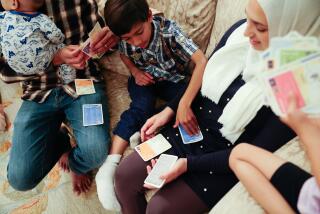Children Lack the Art of Self-Amusement : Traditions: Victorian youngsters entertained themselves with holiday activities. A new book explores that lost pastime.
- Share via
Children 100 years ago used to occupy themselves by making holiday paper decorations such as snowflakes and lanterns And families would create Advent wreaths and calendars. They might have had a taffy pull to amuse themselves during long winter evenings.
Families have it within their power to resurrect these wholesome and homely pastimes. Mrs. Sharp will tell them how.
“Children learning how to amuse themselves is practically a lost art,” said Sarah Ban Breathnach, author of “Mrs. Sharp’s Traditions” (Simon & Schuster), a compendium of Victorian customs, ceremonies and amusements for seasons and holidays year-round.
“A modern child, if there’s nothing on television, or he doesn’t have a ready-made toy, is bored,” Ban Breathnach (pronounced Bon Brannock) said. In contrast, the Victorian child could get inspiration and instructions for simple crafts from children’s or women’s magazines, such as Godey’s Lady’s Book, Demarest’s Family Magazine, the Mother’s Magazine, or the Illustrated London News (many of these were published on both sides of the Atlantic). “The crafts gave them a sense of the family working together,” she said.
Ban Breathnach says the Victorians practically invented the traditional Christmas. Before the middle of the 19th Century, the holiday was observed but not celebrated, a legacy of the Puritan era. By mid-century, though, Dutch and German immigrant families arrived, bringing with them their customs for merrymaking and celebrating. And across the ocean, Queen Victoria married Prince Albert, who introduced the Christmas tree and other German traditions to England and America.
The reasons behind their yearning for ceremony and custom were surprisingly similar to those for present-day revivals.
“There was a great upheaval in the lifestyle of the Victorians. They were moving from the farms to the cities. The railroad had changed their lives by letting them move more freely around the country. Along with this, the woman’s role as an educator and home manager became magnified. She was responding to what she thought home life should be,” Ban Breathnach said.
They often felt threatened by new things; there even were sermons preaching against the corrupting influence of ice cream parlors.
“They turned to traditions to give them a sense of control over their lives.”
So today, with violence on the street and on television, and a recession possible, people feel the same way, she said. “There’s the sense that things are out of control again.”
She became interested in the period when she found some of the old magazines while browsing in an antique shop. “I got transported back to the Victorian era when life seemed so ordered, so serene and blissful--so completely unlike my own life,” she writes in the foreword to the new book. “Like 50 million other working women juggling the demands of work and raising a family, all I knew about home life was that when push came to shove, what got shoved out of my life was the very thing I valued most: quality family time.”
So she created the mythical Mrs. Sharp, a Mrs. Beeton-like authority on family tradition. Ban Breathnach did a radio series on the subject for National Public Radio and ran workshops about Victorian holiday and seasonal pastimes. Later she started a column for the Washington Post Writers Group.
Though the character is fictional, the name is real. She is married to Edward F. Sharp, a Washington lawyer and City Council member in Takoma Park, Md.
Now dear readers can find out how to cut snowflakes for their trees or holiday tables. They can learn about Stir-Up Sunday, when preparations for holiday goodies, including the Christmas pudding, begin. They can read about Victorian sugarplum trees, or Santa Lucia’s Day, or the entire Christmas holiday cycle culminating in Twelfth Night celebrations. They can try recipes and crafts, included in the text.
Ban Breathnach also has a few words of advice to single parents.
“Sometimes single parents feel left out of it. But it’s important to carry on the traditions to help establish an equilibrium for the children.”
And she urges Jewish parents to invite their children’s Christian friends to share Hanukkah traditions and not feel pressured to turn the holiday into a “Jewish Christmas.” She recalls her own daughter was fascinated by the menorah when invited by a Jewish schoolmate to share a family festival of lights observance.
But whatever they do, families should celebrate together, she said. “The Victorians did these things all year. It gave them a sense of continuity, of being in rhythm.”
More to Read
Sign up for our Book Club newsletter
Get the latest news, events and more from the Los Angeles Times Book Club, and help us get L.A. reading and talking.
You may occasionally receive promotional content from the Los Angeles Times.





